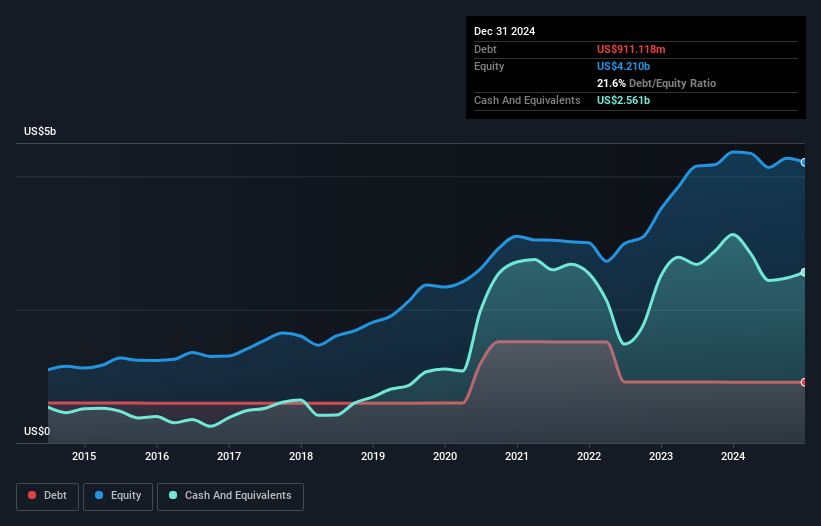- United States
- /
- Consumer Durables
- /
- NYSE:NVR
These 4 Measures Indicate That NVR (NYSE:NVR) Is Using Debt Safely
Some say volatility, rather than debt, is the best way to think about risk as an investor, but Warren Buffett famously said that 'Volatility is far from synonymous with risk.' It's only natural to consider a company's balance sheet when you examine how risky it is, since debt is often involved when a business collapses. We note that NVR, Inc. (NYSE:NVR) does have debt on its balance sheet. But the more important question is: how much risk is that debt creating?
Why Does Debt Bring Risk?
Generally speaking, debt only becomes a real problem when a company can't easily pay it off, either by raising capital or with its own cash flow. If things get really bad, the lenders can take control of the business. However, a more usual (but still expensive) situation is where a company must dilute shareholders at a cheap share price simply to get debt under control. Of course, plenty of companies use debt to fund growth, without any negative consequences. When we think about a company's use of debt, we first look at cash and debt together.
What Is NVR's Debt?
As you can see below, NVR had US$911.1m of debt, at December 2024, which is about the same as the year before. You can click the chart for greater detail. But it also has US$2.56b in cash to offset that, meaning it has US$1.65b net cash.

How Strong Is NVR's Balance Sheet?
The latest balance sheet data shows that NVR had liabilities of US$831.5m due within a year, and liabilities of US$1.34b falling due after that. Offsetting these obligations, it had cash of US$2.56b as well as receivables valued at US$54.3m due within 12 months. So it actually has US$444.7m more liquid assets than total liabilities.
This surplus suggests that NVR has a conservative balance sheet, and could probably eliminate its debt without much difficulty. Succinctly put, NVR boasts net cash, so it's fair to say it does not have a heavy debt load!
Check out our latest analysis for NVR
The good news is that NVR has increased its EBIT by 9.6% over twelve months, which should ease any concerns about debt repayment. There's no doubt that we learn most about debt from the balance sheet. But ultimately the future profitability of the business will decide if NVR can strengthen its balance sheet over time. So if you're focused on the future you can check out this free report showing analyst profit forecasts .
But our final consideration is also important, because a company cannot pay debt with paper profits; it needs cold hard cash. NVR may have net cash on the balance sheet, but it is still interesting to look at how well the business converts its earnings before interest and tax (EBIT) to free cash flow, because that will influence both its need for, and its capacity to manage debt. During the last three years, NVR produced sturdy free cash flow equating to 73% of its EBIT, about what we'd expect. This free cash flow puts the company in a good position to pay down debt, when appropriate.
Summing Up
While we empathize with investors who find debt concerning, you should keep in mind that NVR has net cash of US$1.65b, as well as more liquid assets than liabilities. And it impressed us with free cash flow of US$1.3b, being 73% of its EBIT. So we don't think NVR's use of debt is risky. When analysing debt levels, the balance sheet is the obvious place to start. But ultimately, every company can contain risks that exist outside of the balance sheet. For example, we've discovered 2 warning signs for NVR (1 is significant!) that you should be aware of before investing here.
If, after all that, you're more interested in a fast growing company with a rock-solid balance sheet, then check out our list of net cash growth stocks without delay.
Valuation is complex, but we're here to simplify it.
Discover if NVR might be undervalued or overvalued with our detailed analysis, featuring fair value estimates, potential risks, dividends, insider trades, and its financial condition.
Access Free AnalysisHave feedback on this article? Concerned about the content? Get in touch with us directly. Alternatively, email editorial-team (at) simplywallst.com.
This article by Simply Wall St is general in nature. We provide commentary based on historical data and analyst forecasts only using an unbiased methodology and our articles are not intended to be financial advice. It does not constitute a recommendation to buy or sell any stock, and does not take account of your objectives, or your financial situation. We aim to bring you long-term focused analysis driven by fundamental data. Note that our analysis may not factor in the latest price-sensitive company announcements or qualitative material. Simply Wall St has no position in any stocks mentioned.
About NYSE:NVR
Flawless balance sheet with acceptable track record.
Similar Companies
Market Insights
Community Narratives


Recently Updated Narratives

Astor Enerji will surge with a fair value of $140.43 in the next 3 years

Proximus: The State-Backed Backup Plan with 7% Gross Yield and 15% Currency Upside.


A case for for IMPACT Silver Corp (TSXV:IPT) to reach USD $4.52 (CAD $6.16) in 2026 (23 bagger in 1 year) and USD $5.76 (CAD $7.89) by 2030
Popular Narratives


MicroVision will explode future revenue by 380.37% with a vision towards success


The company that turned a verb into a global necessity and basically runs the modern internet, digital ads, smartphones, maps, and AI.



